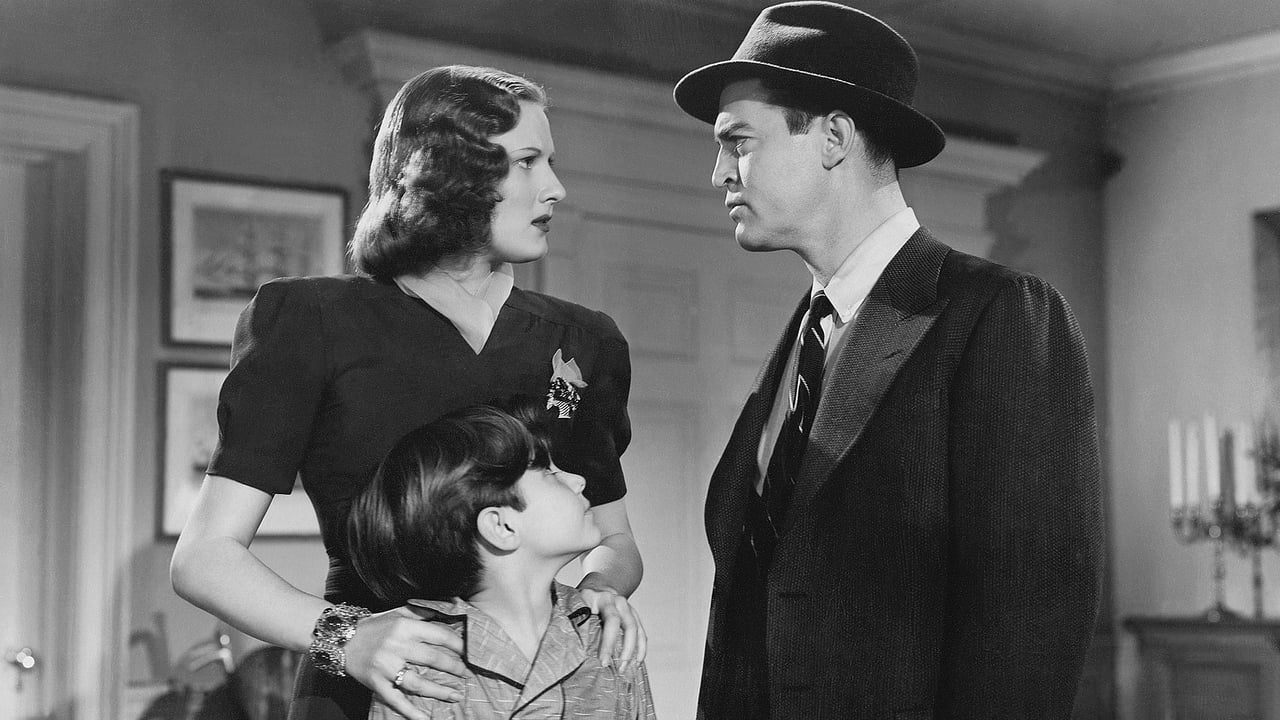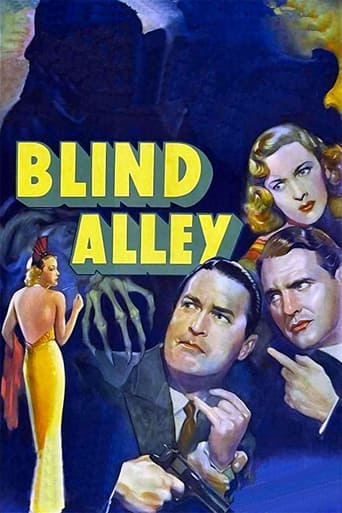

Some things I liked some I did not.
... View MoreVery interesting film. Was caught on the premise when seeing the trailer but unsure as to what the outcome would be for the showing. As it turns out, it was a very good film.
... View MoreGo in cold, and you're likely to emerge with your blood boiling. This has to be seen to be believed.
... View MoreAmazing worth wacthing. So good. Biased but well made with many good points.
... View MorePsychology professor Ralph Bellamy finds himself the victim of the type of criminal he's been studying and teaching students about when a violent gangster (Chester Morris), newly escaped from prison, busts in on his evening dinner party, taking him and his family and his guests hostage. This is an early variation of "The Desperate Hours", but the criminal will find that the tables will be turned on him when Bellamy vows to his wife (Joan Perry) that he will use his knowledge to destroy Morris in order to save them all, especially after Morris shoots and kills one of Bellamy's favorite students in cold blood.It's very ingenious and well crafted, and Bellamy's description to Morris about how the brain works is quite interesting, focusing on the conscience and sub conscience parts and how the conscience refuses to allow the sub conscience to enter that part of the brain in fear of being destroyed. Even a criminal with a violent nature like Morris has an issue that could destroy him, and here, Bellamy uses Morris's dreams in order to get to that sub conscience. In one of the best filmed dream sequences in film history, Morris reveals through his sub conscience the fears he's been living with all of his life. This makes his mistress (a very nervous Ann Dvorak) angry and threatens more violence.Excellent both in its analytical matter and exposition that is never "teachy", "Blind Alley" is an early film noir where the mind is both the villain and the hero. The cast is uniformly excellent, although I'd have to describe Melville Cooper's character as a stupid fool whose actions could get everybody killed. Bellamy and Morris play each other like a chess game, an ironic twist of fate considering the chess board uniquely featured in Bellamy's den. This was remade less than a decade later as "The Dark Past" which explored even more of its film noir elements, but the original version is equally as thrilling.
... View MoreBlind Alley (1939) *** (out of 4) Columbia thriller based on a 1935 Broadway play has Chester Morris playing a gangster who escapes from prison and eventually takes a psychiatrist (Ralph Bellamy) and his family and friends hostage. Soon the psychiatrist starts to work on the gangster to try and break him down so that everyone can make it out of the situation okay. This is an extremely well made and well acted "B" film that manages to be very entertaining from start to finish. What really sets this film apart from others like it are the performances by the two leads. Morris, due to his Boston Blackie films, has become one of my favorite actors and I think this is the best work I've seen from him. The character he plays is pretty much cold-hearted from start to finish and is just as dark as the character he played in Three Godfathers. There's no charm in this character and Morris really comes off as a very threatening figure. He also manages to be very convincing during the mental breakdown scenes when the doctor starts to work him over. Bellamy, another one of my favorite "B" actors, is also very good. His calm, cool and collective nature and that wonderful voice really pays off well here against Morris. Ann Dvorak from Scarface turns in fine support as the gangster's girlfriend. There are a couple very interesting aspects worth noting. One is an underlined child molestation that Morris suffered as a child. This isn't thrown out into the open but it isn't hinted at, which I'm surprised got by the Hayes Office. Another interesting segment is the dream sequence where we see a dream that is constantly haunting Morris. This was shot with a reverse negative and the look is very good and eerie. This film was later remade as The Dark Past.
... View MoreThis B-film from the late thirties can probably be considered way ahead of its time, dealing as it does with a psychiatric solution for the climax of the story. Hollywood would go much further with such themes in the '40s with the advent of films like "Spellbound", "Possessed" and "The Snake Pit".RALPH BELLAMY is a pipe-smoking psychiatrist with a calm, cool demeanor who appears undisturbed when a psychotic serial killer (CHESTER MORRIS) and his gang intrudes on family and friends during a quiet holiday weekend. When Morris turns out to have bad dreams, psychiatrist Bellamy goes to work tracing the events that trigger the nightmares. Director Charles Vidor uses reverse negative images imaginatively to depict the dream sequence which movie buffs can immediately solve without any explanations from Bellamy.ANN DVORAK is the gun moll acting tough with the house guests and confining the servants to the cellar, and MARC LAWRENCE is effective as one of the tough guys. MELVILLE COOPER has a role in which he's unusually heroic a year after playing the cowardly sheriff in "The Adventures of Robin Hood". SCOTTY BECKETT is a lively presence as the little boy who talks back to the bad men.But the pat solution is too simplistic and the fact that Morris is willing to even listen to Bellamy's sermonizing and psychiatric talk makes the whole thing quite unrealistic. The remake with William Holden had the same problem and the same glaring faults. Another distraction is CHESTER MORRIS who seems to be chewing the scenery in his over-the-top impersonation of the psychotic killer.
... View MoreA couple of gangsters, led by Chester Morris and his moll, Anne Dvorak, invade the very proper and bourgeois vacation lodge of psychiatrist Ralph Bellamy and his guests, and they take the place over while waiting either for a chance to escape or a chance to shoot it out with the cops.I'll tell you something. Chester Morris couldn't have stumbled into a wronger place. The tweedy, pipe-smoking, unflappable Ralph Bellamy pegs Morris immediately as a Freudian delight. To pass the hours away, between chess games, Bellamy beings to probe Morris, gently. Why, for instance, does Morris have those hysterically paralyzed fingers? Why does he have that recurring dream about rain dripping through the hole in his umbrella? At first, Morris reacts irritably to all this "screwy" stuff. "You're screwy!", he tells Bellamy. Everything Morris, in his ne plus ultra gangsta mode, does not understand, he calls "screwy." That renders just about everything in Bellamy's greater vicinity "screwy" because Morris understands nothing of what's going on.Bellamy helpfully draws him a sort of a cartoon, illustrating the mind, according to the received wisdom of 1939. You see, this is the inside of your head. And up here is the conscious mind -- everything you know about. But down here is what we call the unconscious, the bad stuff that the conscious mind wants to forget about. There's a guardian that keeps the unconscious down where it belongs, called "the censor band." But -- are you taking notes? -- but sometimes the censor weakens, as when we fall asleep, and some of the unconscious memories and desires can creep out in disguised form and show up in our dreams. Or sometimes the forbidden memories take the form of physical symptoms, such as paralyzed hands or fingers. The wind up is that Chester Morris is cured in sixty-nine minutes by Ralph Bellamy. He'll never shoot another gun.Actually, Bellamy's explanation of psychoanalysis according to Freud isn't badly presented. I'm glad he stuck with Freud and only two levels of consciousness. If he had ever gotten into Carl Jung, who split up the personality into so many overlapping and contradictory parts that they could have spread out and still filled up the heads of a dozen ordinary neurotics -- well, the audience would have been afloat in a world of some sticky dualistic excreta.At that, though, the movie was probably interesting and educational in 1939, the year of Freud's death. Psychoanalysis was about at its peak and there may have been a certain public curiosity about just what was going on. This answers the question, though it does so in the same way that the Catholic catechism explains the mysteries of the world. "Who made the world?" "Freud made the world." A bit more than a decade later, it was remade almost shot-for-shot as the noir-sounding "The Dark Past," with William Holden running around and calling everybody "screwy." Holden is a more versatile actor than Chester Morris, but this role is so stereotyped that Morris and his clipped sneer are preferable. Still, it's of interest in reflecting certain interests, not just of 1939 or 1950, but of more enduring value. After all, Freud practically invented the subconscious single-handed, and without our grasp of psychodynamics, would we have the efficient marketing we have today of Viagra and SUVs and politicians?
... View More